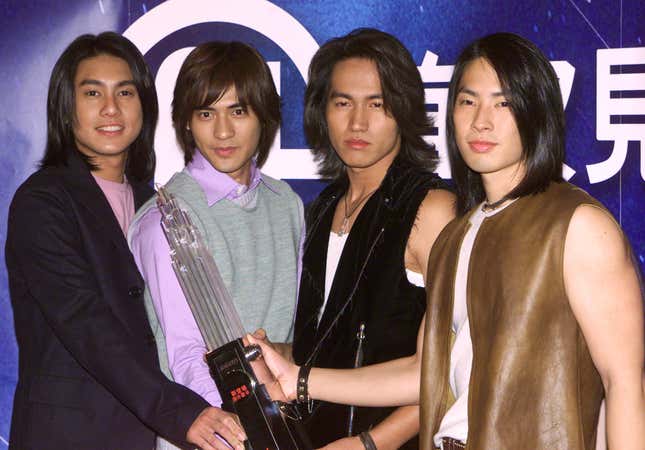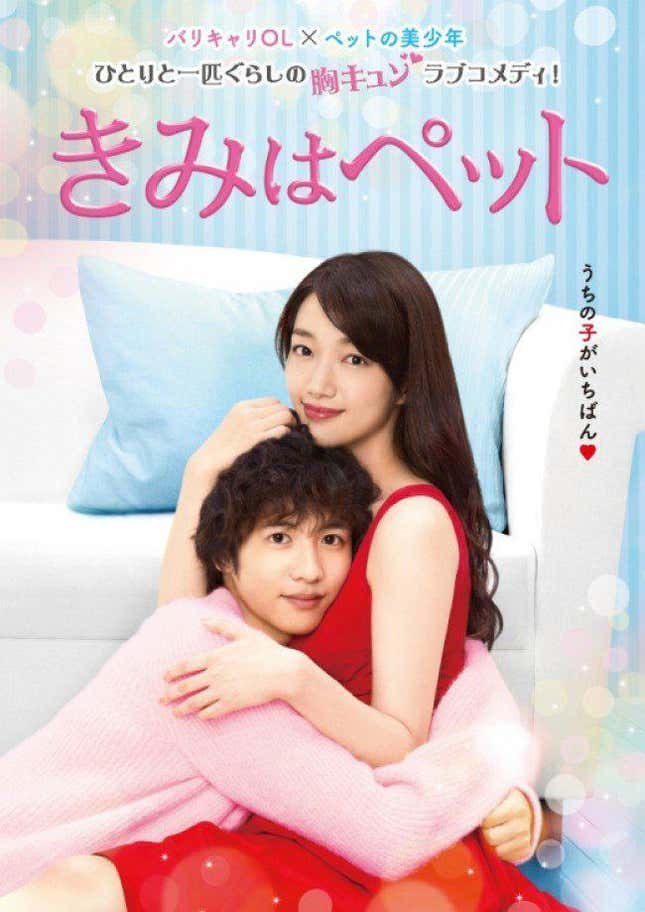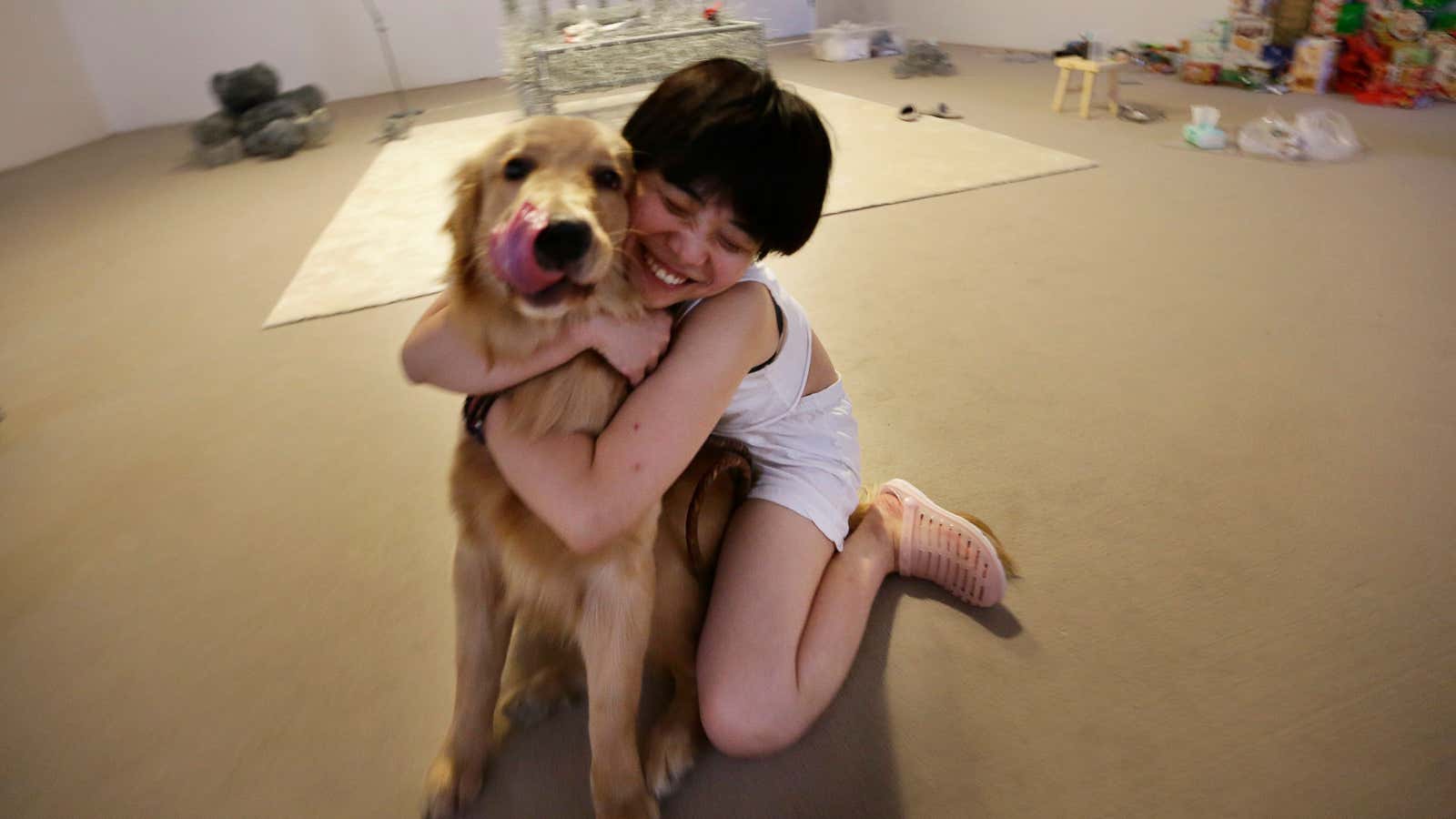Lilac wants to date a “little puppy,” because, as she puts it, he would be “the exact opposite of the guys around me, including my boyfriend.”
The 25-year-old, who works at a Shanghai-based online publication and only wants to be identified by her English name, said that her boyfriend doesn’t compliment her enough on her looks. A little puppy, on the other hand, would always know to tell her, “You are the best.” After their latest argument, the two decided to take a break from their year-long relationship.
In China, “little puppy,” or 小奶狗 (xiǎo nǎigǒu), refers to a man who is younger than his girlfriend, whose qualities in the eyes of his lover include being simple, naive, considerate, and caring—and most importantly, loyal and clingy, just like a pet. The rise of little puppies as an ideal type of boyfriend points toward a shift in popular culture in the country, where young women are increasingly defying traditional attitudes toward romance.
“Pretty sister who buys me food”
The ideal romantic male figure in the eyes of Chinese women has evolved with pop-culture fads over the past decades. Throughout the 1980s and 1990s, the macho image as embodied by the late Japanese actor Ken Takakura—who starred in the 1976 action thriller Manhunt, the first foreign hit on Chinese big screens after the traumatic Cultural Revolution—was all the rage. That gave way in the 2000s to a taste for men with flowing locks and floral shirts, largely thanks to the influence of television shows like Taiwanese drama Meteor Garden, which spawned F4, one of Asia’s most popular boy bands ever.

Shows like Meteor Garden portrayed women in Cinderella-esque roles—damsels of lower social rank who would inevitably end up falling in love with a older, handsome, wealthy man. The genre of TV shows spawned a new internet meme (link in Chinese) called “overbearing CEO,” referring to such men, who were for many years seen as the ideal boyfriend type.
Today, China’s entertainment industry celebrates the “little fresh meat” male prototype, which describes young idols who have slim physiques, flawless skin, and wear make-up. Female fans declare their feverish love for such men by labelling themselves as their idols’ “girlfriends,” “aunties,” or “moms,” depending on their age. Inspired by South Korean fandom, many even compete among each other to see who can spend more on their idols, for example by taking out ads to celebrate their birthdays.

More recently, puppy-like boyfriends are ballooning in popularity on China’s internet thanks to TV dramas that feature relationships between older women and younger men. One of them is Korean drama Something in the Rain, which is translated in Chinese as Pretty Sister Who Buys Me Food. Another is an adaptation of Japanese manga You’re My Pet, which tells the story of a working woman who takes in a homeless man living in a box at her doorstep, and then falls deeply in love with him. Inspired by the show’s title, China’s internet users started using dogs to categorize different types of men:
- 小奶狗 (xiǎo nǎigǒu): “Little puppy,” a younger guy who’s good-looking, loyal, and clingy.
- 小狼狗 (xiǎo lánggǒu): “Little wolf dog,” a younger guy who’s good-looking, loyal, and makes women feel protected.
- 老狗逼 (lǎo gǒubī): “Old dog’s vagina,” an unattractive, slimy, older man.
What it’s like to date a little puppy
A viral blog post (link in Chinese) on Chinese social media published in March, titled “It’s so sweet to date little puppies!” rounds up several women’s accounts of what it’s like to have a puppy-like boyfriend. One said her boyfriend always demands that they sleep face-to-face while cuddling. Another boasted that hers always compliments her whether she wears makes-up or not, no matter how dark her under-eye circles are. A third woman said her little puppy keeps a notebook of all the things he’s done to make her angry so that he won’t do them again.
“In the past, we all wanted to find a ‘father,’ and to be loved like a daughter. Now, we all want to find a ‘son,’ and to be respected like a mother,” concluded the article, which was published on a popular blog about social trends.
Other women said that what they like best about dating a little puppy is the feeling of being loved generously and unconditionally.
Chen, a 27-year-old woman who shuttles between Chicago and China for her software startup who only wanted to use her last name, was dating someone eight years her junior in her most recent relationship. Older men always prioritize other things in their lives over romantic relationships, Chen said, but “this would never happen with little puppies.” One time, she recalled, her little-puppy ex skipped class in high school for a whole week, and flew from Seattle to Hong Kong to keep her company during her business trip. “I never thought he would really come,” she said.
She theorized that dating a younger man brings out the best out of both parties in the relationship because they both end up setting higher standards for themselves. Chen said being with a puppy made her try to be more reasonable and less demanding, while her ex, who was afraid he wasn’t mature enough, tried to become more caring.
Wang, a 25-year-old master’s student studying law in the UK who also only wanted to be identified by her last name, is dating a man two years her junior at her university, and expressed similar sentiments about her lover. “Although he doesn’t know how to take care of people, he is trying his best to.” Since they moved in together in a London apartment, her boyfriend has been learning to cook for her despite “never having washed a dish for his mom.”
The rise of girl power
The popularity of little puppies defies Chinese cultural convention. Chinese people traditionally desired marriages that were well-matched in terms of wealth, education, and social class, among other criteria. Most people entered the dating scene with those ideas in mind—women typically wanted to date men who owned property, and who were wealthier and more successful professionally than themselves.
The growing interest in little puppies is partly a reflection of the changing socioeconomic status of women in China. A survey conducted early this year found that although Chinese women are still earning 22% less than men on average, the gap is narrowing, with the difference at 30% the year before. Modern Chinese women living in major cities care less and less about finding a “proper match,” at least in terms of wealth.
Views on love and marriage in China are also becoming more diverse. China now has more singles than ever, while the country’s marriage rate falls and the divorce rate goes up. In major cities, more and more couples are choosing not to have kids altogether. Chinese women and men now see more paths to happiness in relationships, and the little-puppy phenomenon is another such option.
About a week into her break with her boyfriend, Lilac, the Shanghai-based reporter, added him back on chat app WeChat after she saw that he kept checking her game status in the mobile hit Honor of Kings. He really cares about her but is too shy to tell her, Lilac surmised.
Lilac said she would really love to date a little puppy, but that they are too rare in real life. It’s more like a concept women are yearning for. “This breed barely exists.”
